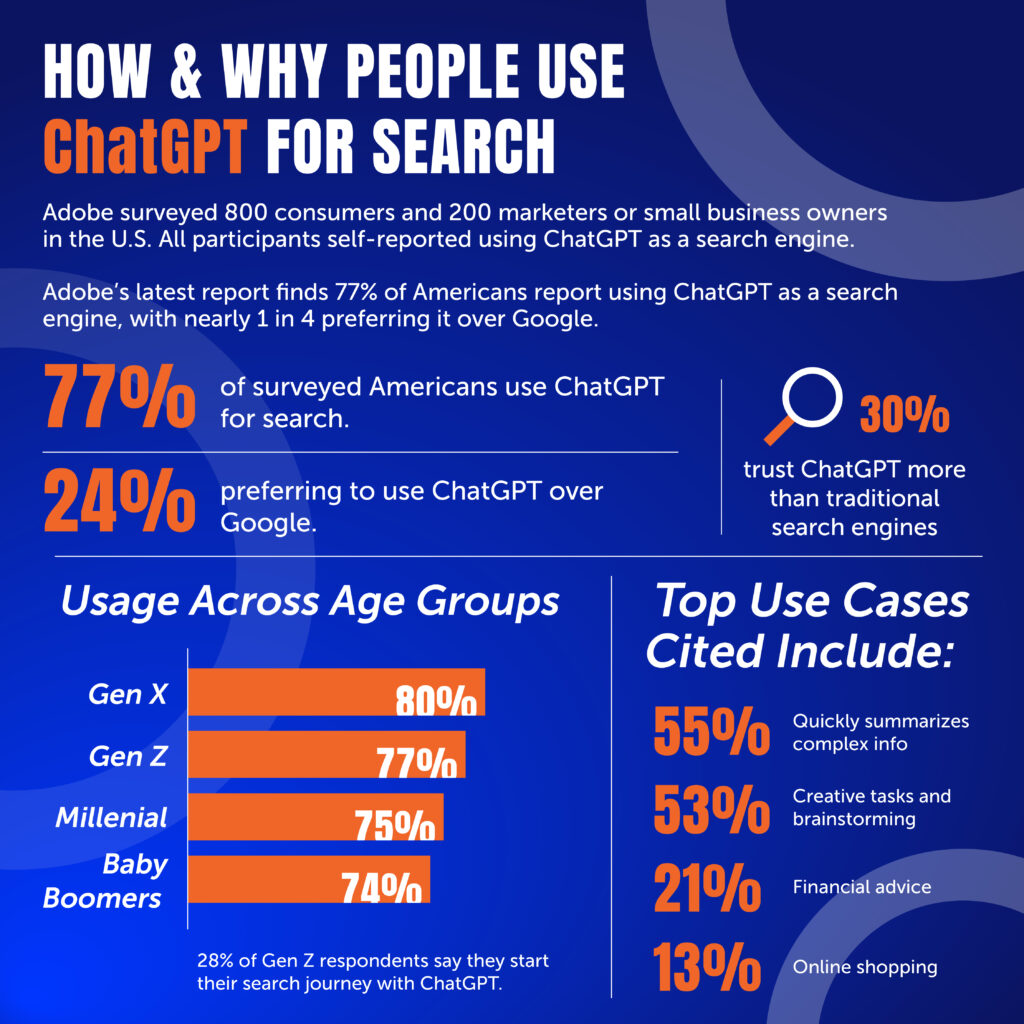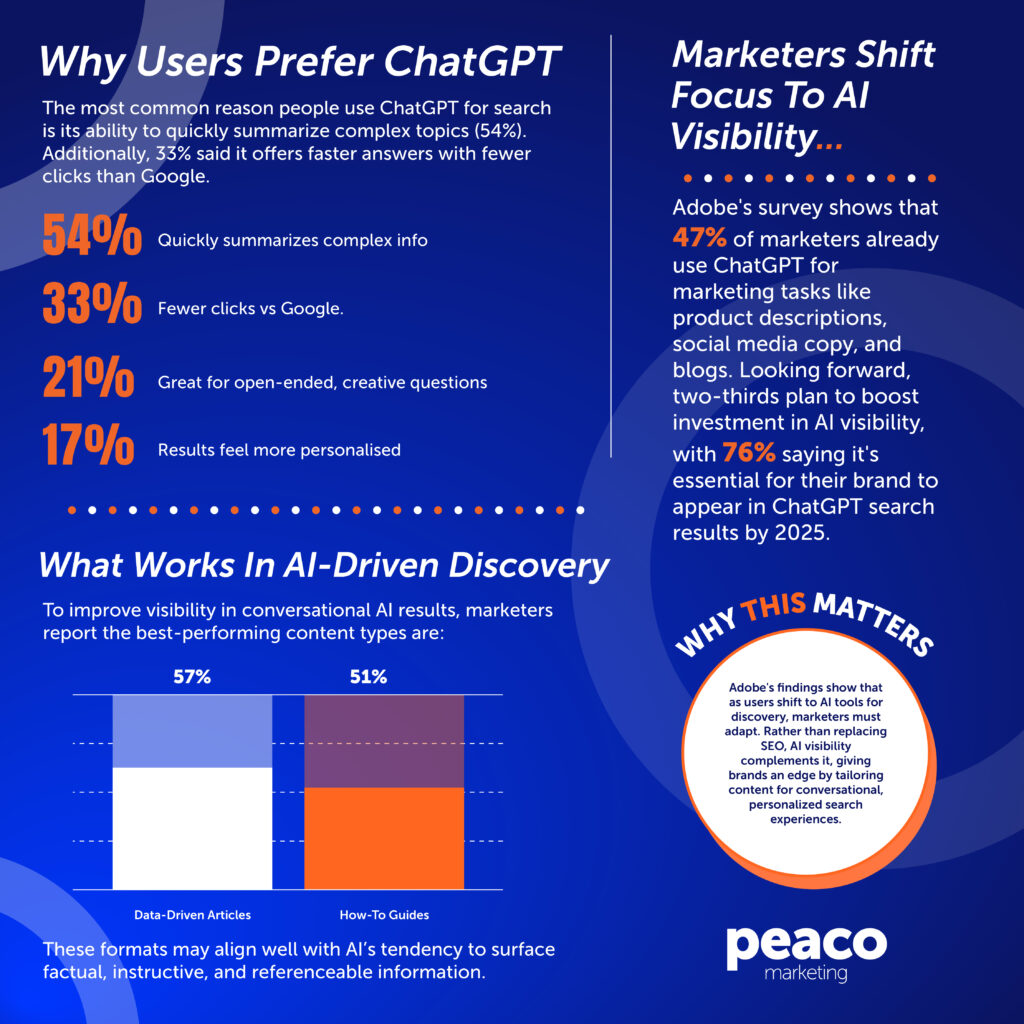The way we find information online is changing — fast. For decades, Google has been the go-to for searching the web. But a new trend is emerging: people are turning to ChatGPT and other AI tools to ask questions, discover products, and make decisions. This shift isn’t just hype — it’s backed by data.
A 2025 survey by Adobe reveals that 77% of U.S. users now use ChatGPT as a search engine, and nearly one in four (24%) turn to it first before opening Google, Bing, or another traditional search tool. It’s not just about convenience — users are choosing AI because it’s faster, more intuitive, and often more trustworthy.
In this article, we’ll explore:
- Why ChatGPT is becoming the new search engine
- How it’s transforming online shopping
- What this means for businesses and digital marketers
- How it compares with other AI search tools like Perplexity and Google AI Mode

Why Are People Using ChatGPT for Search?
Unlike traditional search engines, ChatGPT offers human-like answers in a conversational format. Instead of sifting through 10 blue links, users can ask a specific question and get a tailored, direct response — often with follow-up context, product suggestions, or summaries of online reviews.
According to Adobe’s survey of 1,000 U.S. respondents:
- 77% use ChatGPT as a search engine
- 24% go to ChatGPT first, ahead of Google or other platforms
- 28% of Gen Z prefer ChatGPT first, making them the most AI-native generation
- 30% of users trust ChatGPT more than traditional search engines
- 36% of users have discovered a new product or brand through ChatGPT — rising to 47% among Gen Z and 37% among Gen X
This data shows that ChatGPT isn’t just being used for trivia or fun conversations — it’s influencing buying behaviour, brand discovery, and trust in information sources.
ChatGPT Is Changing the Way We Shop
One of the most significant use cases of ChatGPT-as-search is product research. Whether users are hunting for the best wireless headphones, a dog costume for Halloween, or a budget-friendly air fryer, ChatGPT now offers a visually rich shopping experience directly within its interface.
In GPT-4o and GPT-4o-mini, queries with shopping intent (like “best laptops for under £1,000” or “eco-friendly yoga mats”) trigger product carousels with:
- Image previews
- Simplified titles and descriptions
- Summarised user reviews
- Feature labels like “Budget-friendly” or “Most Popular”
- Links to relevant retailers
- Price information (with links to multiple sellers)
These aren’t ads. ChatGPT selects products based on user intent and contextual clues — for example:
- If a user mentions a price limit, ChatGPT prioritises budget options
- If a user previously said they dislike a certain style (e.g. clown costumes), the model may exclude related products
Sources of data include:
- Structured metadata from third-party providers (price, ratings, descriptions)
- Public product reviews and websites
- ChatGPT’s internal model-generated insights and safety filters
What makes this different from Google Shopping?
With Google, users still need to sift through links, ads, and varying layouts. ChatGPT, on the other hand, curates information and removes the friction — it summarises what people love or hate about a product and gives users what they need to make quick, informed decisions.
It’s product discovery with fewer distractions and more personalisation.

What This Means for Brands and Marketers
The growing popularity of AI search is shaking up the traditional SEO and PPC landscape. If people are finding brands directly through ChatGPT, ranking on Google is no longer the only game in town.
Adobe’s research found that:
- 47% of marketers and small business owners are already using ChatGPT to market or promote their business
- Two out of three plan to increase their focus on AI visibility in 2025
This means businesses now need to:
- Optimise product data (titles, descriptions, pricing, metadata) so AI tools can parse and present it accurately
- Create customer-centric content that AI models can summarise and surface in response to real questions
- Think beyond search engine rankings — and towards AI engine visibility
Even things like how users talk about your product in reviews can influence whether ChatGPT includes you in its suggestions.
AI Search Engines at a Glance: How ChatGPT Compares
While ChatGPT is leading the charge in AI-powered search, several other platforms are gaining traction. Zapier recently compared the top options:
| AI Tool | Best For | Standout Feature | Pricing |
|---|---|---|---|
| ChatGPT | Conversational search & shopping | Product carousels, memory, custom instructions, review summaries | Free; GPT-4o+ from $20/month |
| Perplexity | Deep research, follow-up questions | Organised search results with sources and citations | Free basic features; $20/month Pro |
| Google AI Mode | Combining AI + traditional results | Toggle between AI and classic search | Free; Gemini Advanced $19.99/month |
| Arc Search | Mobile-first AI browsing | “Browse for Me” feature summarises entire topics across sources | Free on iOS and iPadOS |
While each platform has its own strengths, ChatGPT stands out for product discovery and everyday search, especially when users want a quick answer without bouncing between tabs.
The Future of Search Is Conversational — and AI-Driven
Whether you’re a consumer looking for quick answers or a business trying to stay visible online, the message is clear: search is evolving, and ChatGPT is at the forefront of this change.
For users, the benefits are obvious:
- More relevant answers
- Less time spent searching
- Easier product research
- Personalised suggestions based on preferences
For businesses, it presents both a challenge and an opportunity:
- A challenge to adapt content and data for new platforms
- An opportunity to get discovered in a more natural, question-based way
As Gen Z and younger millennials continue to make AI their default tool, expect this shift to accelerate. In the near future, asking a chatbot like ChatGPT for advice — whether it’s “where to eat tonight” or “what CRM should I use” — might be the norm, not the exception.
Final Thoughts
ChatGPT isn’t just a tool — it’s a new interface for the internet. Its rise as a go-to search engine shows that people value speed, simplicity, and relevance over long lists of links. If your brand or business isn’t already thinking about how to show up in AI-driven searches, now is the time to start.
Sources:

